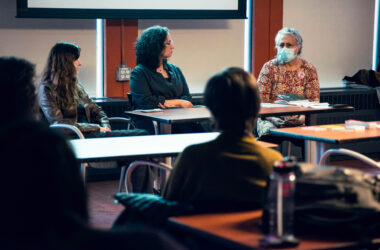After a day-long conference yesterday at the International Civil Aviation Organization in Montreal, members of the international community working along with Haitian Prime Minister Jean-Max Bellerive put forward a general framework outlining future support for Haiti, the nation that was devastated by an earthquake on January 12.
The Ministerial Preparatory Conference, organized by the Canadian government and chaired by Lawrence Cannon, the minister of foreign affairs, brought together representatives from many countries as well as delegates from the United Nations, the World Bank, and various NGOs.
In his opening remarks, Prime Minister Stephen Harper said that the ultimate goal of the meetings was to agree on principles to guide the international community’s approach to Haiti’s reconstruction, and emphasized that any plan must be based on a long-range timeline.
“Sustainability is key. We need to commit to Haiti for the long term,” he said. “It is not an exaggeration to say that 10 years of hard work awaits the world in Haiti.”
Bellerive also emphasized the importance of long-term planning, and said that it will take at least five or six years for the country to even return to point zero. In addition, he identified three main reasons why he believes it was difficult for Haiti to respond effectively to the crisis on its own: the structure of the Haitian government, the country’s excessive centralization, and a lack of human resources.
In response to these issues, Bellerive called for increased co-ordination between governments, decentralization, and integration of the diaspora. All of the delegates agreed, however, that even though co-ordination is key, reconstruction efforts must always put Haitian sovereignty first.
“It’s important to see ourselves as partners with Haiti, not patrons,” said U.S. Secretary of State Hillary Clinton. “That is not only the right thing to do, but given what we’ve learned over many years about development, it is the smart approach. We cannot anymore in the 21st century be making decisions for people and their futures without listening and without giving them an opportunity to make as many decisions as possible.”
In addition to sustainability, the delegates identified ownership, co-ordination, effectiveness, inclusiveness, and accountability as the main principles to focus on. Despite reports that the Haitian government had established a sum of $300 billion as the amount needed for reconstruction, Bellerive denied that any official estimate has been reached.
“The amount has not been finalized, but I will be receiving many reports from academics and other experts in the coming weeks,” he said. “There is still too much to assess to make any final estimates.”
French Foreign Minister Bernard Kouchner also emphasized the importance of patience in determining financial benchmarks.
“Ladies and gentlemen, I understand your impatience. I understand that of the Haitians … But we were already engaged in Haiti, some of us for more than 40 years. The United Nations has made immense progress. Security improved, as had governance … Their country was taking charge. And then, the earthquake,” he said. “It’s impossible to say with precision how much [money] we will need now. But we know there are needs in terms of health, education, construction, urbanization, and governance.”
The delegates also determined that they will meet again to continue discussion and planning at the United Nations headquarters in New York City sometime in March. Clinton explained that the upcoming conference will examine various historical examples of responses to natural disasters as models.
“There are some other examples that we will look to. One to mention is what happened after the tsunami, another large natural disaster – particularly how the government of Indonesia worked with the World Bank, the United Nations, and the executive committee of donor nations,” she said.
Clinton also explained that while these models can provide some positive examples, we can also learn from the mistakes that have characterized responses to previous disasters as well.
“We actually think it’s a novel idea to do the needs assessment first, and then the planning, and then the pledging. So it may seem different from what you’re used to,” she said. “I think we’re off to a cautiously optimistic start, given the extraordinary challenges we’re up against, but we’re going to work really hard to do this in a way that in the end people can look back and say they took their time, they did it right, they were as forcefully committed as it was possible.”
Cannon echoed Clinton’s sentiment, and said he was confident that the Montreal meeting had been a success.
“The United Nations is well placed, my colleague the Secretary of State Clinton, as well as the other partners, are all very well placed because in previous years gone by they have had quite a bit of experience in these kinds of disasters,” he said. “We have achieved what we set out to do today. We now have the beginnings of a roadmap towards Haiti’s long-term reconstruction.”







